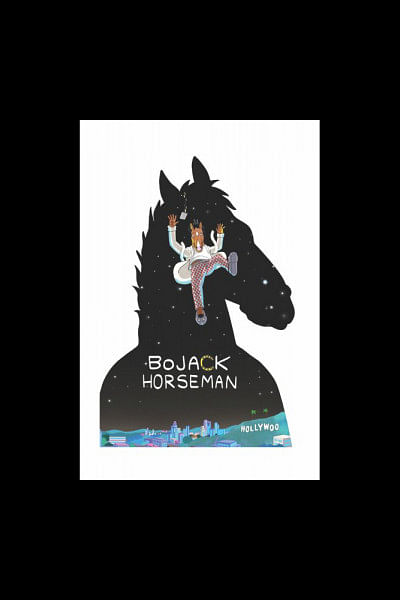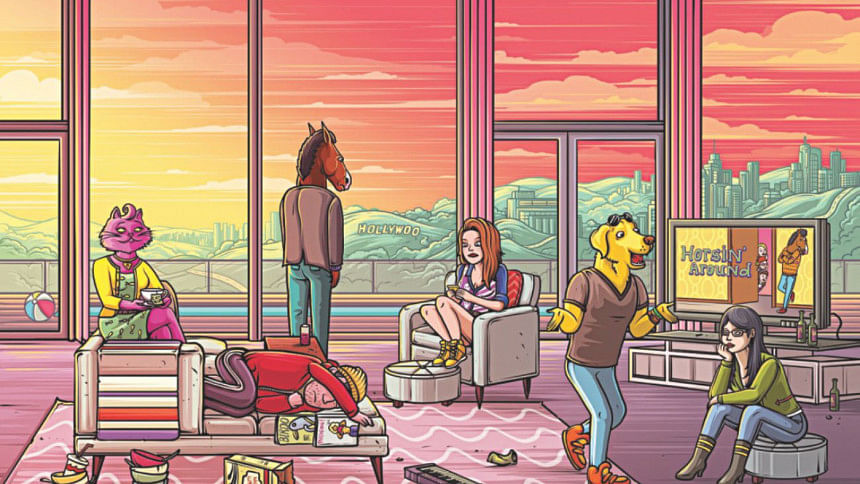Why BoJack Horseman is life

In season four, episode six of Netflix's BoJack Horseman—titled “Stupid Piece of Sh*t”—BoJack effectively loses it with Hollyhock and his dying mother Beatrice living with him. Hollyhock is potentially his daughter from a past hook-up, and Beatrice is the mother he has despised all his life, rightfully so as she spent his childhood blaming, berating, and criticising him. We watch the episode in a different style of animation. Scrawny, spiky shapes and washed-out, chalky monochrome colours for each character, instead of the usual cheerful cartoon sketches. It's a glimpse into the mind of BoJack, where his thoughts constantly remind him that he's, well, the title of the said episode.
The style of animation in this episode shows us how the world looks inside BoJack's mind—confusing, distorted, crude. Chased by his berating thoughts, BoJack leaves the house to buy milk for breakfast and loses the entire day at the bar. He blames himself some more for failing to run common errands, for making his daughter hate him, for hurting his friends Herb, Penny, Sarah Lynn, basically anyone who had been stupid enough to trust him. Watching the episode, you think that it can't possibly get any worse for BoJack. And then Hollyhock asks him, “That voice, the one that tells you you're worthless and stupid and ugly? It goes away, right? It's just, like, a dumb teenage-girl thing, but then it goes away?” BoJack replies with a yes.
That's the thing about this show. You watch BoJack—a celebrity who starred in a popular TV sitcom in the 90s—reach the lowest of lows both mentally and physically. Each depraved act seems like the last straw: from betraying his best friend to sleeping with his former on-screen daughter to pulling her into drug abuse to almost seducing his childhood friend's teenage daughter. And yet he keeps going on. His fellow 'Hollywoo' stars and friends do the same. Diane makes do despite her existential angst and divorce from Mr Peanutbutter, who in turn recovers from three divorces. Princess Carolyn faces her failed relationships and multiple miscarriages in the way that she first appears in the pilot: by landing on her feet. And Todd always, always manages to have an adventure despite the odds. Each of these characters—anthropomorphic or fully human—have wildly different ways of dealing with their problems; yet they all know how to pull through with a shot of alcohol, a dash of insensitivity, and a whole lot of denial. They pull through not because they're strong or likeably resilient, but because that's what life demands of them.

I've never seen a more nuanced portrayal of human strife. Unlike shows like 13 Reasons Why (in which a teenager takes revenge on everyone who has ever hurt her by blaming them for her suicide), BoJack Horseman manages to depict mental illness without glorifying it. It shows characters haunted by the worst kind of emotional demons and yet, somehow, don't consider giving up as an option. Despite the many things horribly wrong with them, it's also empowering to watch them deal with their problems. Friends get married, people fall out of love, roommates move out, and sometimes your parents are horrible people. The lesson you take away from each episode is that it's possible to let others live their lives without holding them accountable for your own suffering.
Incidentally, accountability is one of the most beautifully depicted themes in the show. First aired on Netflix in August 2014, the initial season makes you think that the show revolves around BoJack. But as each of the five seasons unfolds, you get tangled up not only in the lives of the entire cast of characters, but also their individual backstories; there's an explanation for why each and every character turned out the way that they are.
Diane, for instance, is insecure and confused because her parents and brothers have always made fun of her feelings while also relying on her to get every kind of work done. You empathise with her, but you still want to physically shake her into taking a stand and quit being so passive. The same goes for BoJack and his mother and her mother. Beatrice, BoJack's mother, lost her brother in the war and grew up neglected and held up to unhealthy expectations by her parents. She takes out all her bitterness on baby BoJack, bashing at him emotionally for years. You feel your heart breaking when you enter these flashbacks, and then watch BoJack reflect on them with deadpan calmness. But even as you feel sorry for his past, you can't overlook the truly horrible things he does as an adult. Do you blame BoJack, then, for his actions as a grown-up? Or you do blame his parents? Or his parents' parents?
Yes, the show is hilarious. The humour isn't supported by specific characters responsible for bringing the “comic relief”, but by the outrageous and frustratingly real flaws in all the people filling up BoJack's life. Its brilliance lies in the way that the humour is made to be a result of the characters' circumstances, as happens in real life, and the way it pushes the audience to question their own actions and decisions, while also feeling thoroughly entertained. If comedy is indeed tragedy plus time, BoJack Horseman aces the equation.

 For all latest news, follow The Daily Star's Google News channel.
For all latest news, follow The Daily Star's Google News channel. 



Comments